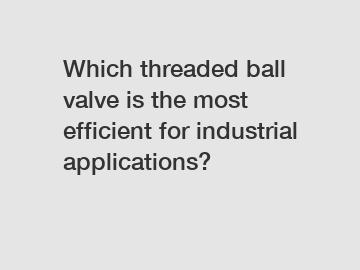Which threaded ball valve is the most efficient for industrial applications?
Which threaded ball valve is the most efficient for industrial applications?
Threaded ball valves are essential components in various industrial processes as they help regulate and control the flow of liquids and gases. Choosing the right threaded ball valve for your industrial application is crucial to ensure efficiency and safety. With numerous options available in the market, it can be challenging to determine which one is the most efficient. In this article, we will discuss the factors to consider when selecting a threaded ball valve for industrial applications and determine which one is the most efficient.
1. Material: One of the most critical factors to consider when choosing a threaded ball valve for industrial applications is the material used in its construction. The material should be durable, corrosion-resistant, and able to withstand high temperatures and pressures. Common materials used for threaded ball valves include stainless steel, brass, and bronze. Stainless steel is the preferred choice for industrial applications as it is highly durable and resistant to corrosion, making it suitable for harsh environments.

2. Size and Pressure Rating: The size of the threaded ball valve should be chosen based on the flow rate and pressure requirements of the industrial process. It is essential to select a valve with a pressure rating that exceeds the maximum operating pressure to ensure safety and prevent leakage. Additionally, the threaded ball valve should have the appropriate pipe connections to ensure a secure and leak-free installation.
3. Operation: Threaded ball valves can be classified based on their operation, such as manual or automated. Manual valves are operated by hand using a lever or gear, while automated valves are controlled electronically or pneumatically. For industrial applications that require frequent operation or remote control, automated threaded ball valves are more efficient and convenient. They can also be integrated into the industrial control system for seamless operation and monitoring.
4. Sealing Mechanism: The sealing mechanism of the threaded ball valve plays a crucial role in preventing leakage and ensuring efficient operation. The most common sealing mechanisms used in threaded ball valves are soft seats and metal seats. Soft seats are made of resilient materials such as PTFE or elastomers and provide a tight seal, while metal seats are more durable and suitable for high-temperature applications. The choice of sealing mechanism should be based on the specific requirements of the industrial process.
In conclusion, when selecting a threaded ball valve for industrial applications, it is essential to consider factors such as material, size, pressure rating, operation, and sealing mechanism to ensure efficiency, reliability, and safety. Among the various options available, stainless steel threaded ball valves with automated operation and metal seats are the most efficient choice for industrial applications. By carefully evaluating these factors and choosing the right threaded ball valve, you can optimize the performance of your industrial processes and achieve smooth operation.
Are you interested in learning more about China china marine cast steel valves supplier, ball valve vs butterfly valve, marine cast steel valves? Contact us today to secure an expert consultation!

Comments